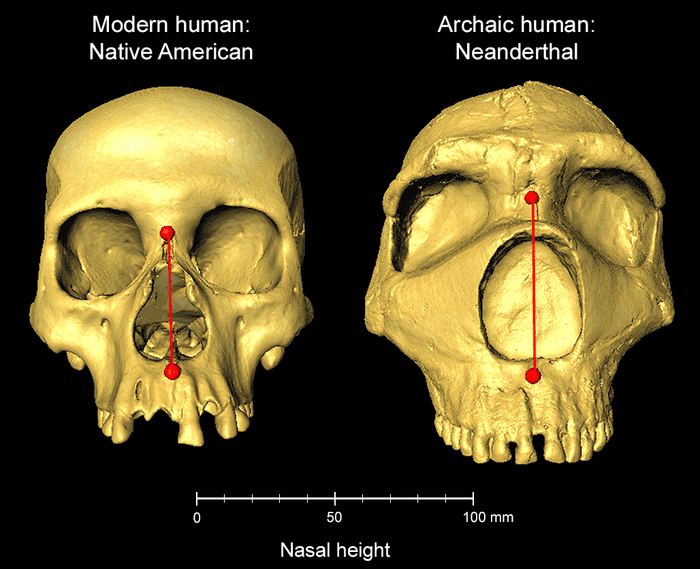If you’re unhappy with the size of your nose then you now have someone to blame, as new research has revealed that certain genes responsible for increasing schnoz length can be traced back to our extinct Neanderthal cousins. According to the study authors, the ancient hominids may have evolved large noses to help them cope with the cold Eurasian climate before passing their elongated hooters on to modern humans when the two species interbred.
“In the last 15 years, since the Neanderthal genome has been sequenced, we have been able to learn that our own ancestors apparently interbred with Neanderthals, leaving us with little bits of their DNA,” explained study author Dr Kaustubh Adhikari in a statement. “Here, we find that some DNA inherited from Neanderthals influences the shape of our faces. This could have been helpful to our ancestors, as it has been passed down for thousands of generations.”
A quick comparison of human and Neanderthal skulls makes it pretty clear that the latter had significantly taller noses, as evidenced by the distance between the nasion – where the top of the nose meets the brow – and the philtrum. To understand how our genes influence our nasal height, the researchers examined the DNA of over 6,000 people from across Latin America.

Modern human and archaic Neanderthal skulls side by side, showing difference in nasal height. Image credit: Dr Kaustubh Adhikari, UCL
Cross-referencing this genetic information with images of participants’ faces, the study authors were able to identify 33 genome regions associated with face shape. Follow-up analyses revealed that 26 of these regions were replicated in separate cohorts from Europe, Africa, and Asia.
Of particular interest was a genetic region called 1q32.3, which shows introgression from Neanderthals and was associated with increased nasal height. One gene in particular – known as the Activating Transcription Factor 3 (ATF3) gene – was found to have evolved due to natural selection, meaning it must have aided the survival chances of those Neanderthals that carried it.
In other words, Neanderthals with longer honkers may have had a higher chance of passing on their DNA.
“It has long been speculated that the shape of our noses is determined by natural selection; as our noses can help us to regulate the temperature and humidity of the air we breathe in, different shaped noses may be better suited to different climates that our ancestors lived in,” explained study author Dr Qing Li. “The gene we have identified here may have been inherited from Neanderthals to help humans adapt to colder climates as our ancestors moved out of Africa.”
The study is published in the journal Communications Biology.
Source Link: Humans Inherited Bigger Noses From Neanderthals